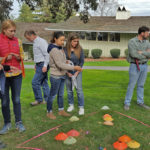
Last week we examined Tuckman’s highly influential Stages of Group Development, which include Forming, Storming, Norming, and Performing. Each stage marks a progression within the group – the way group members interact and function as a whole. Below you’ll find basic explanations of the stages (for more detailed descriptions, check out this post): Forming: The group is coming together for the first time and members are being polite, while also sizing each other up. There’s little unity and potentially limited buy-in to the group’s goals. Storming: Members reveal their true opinions and conflict arises between members and leadership. Norming: People…






